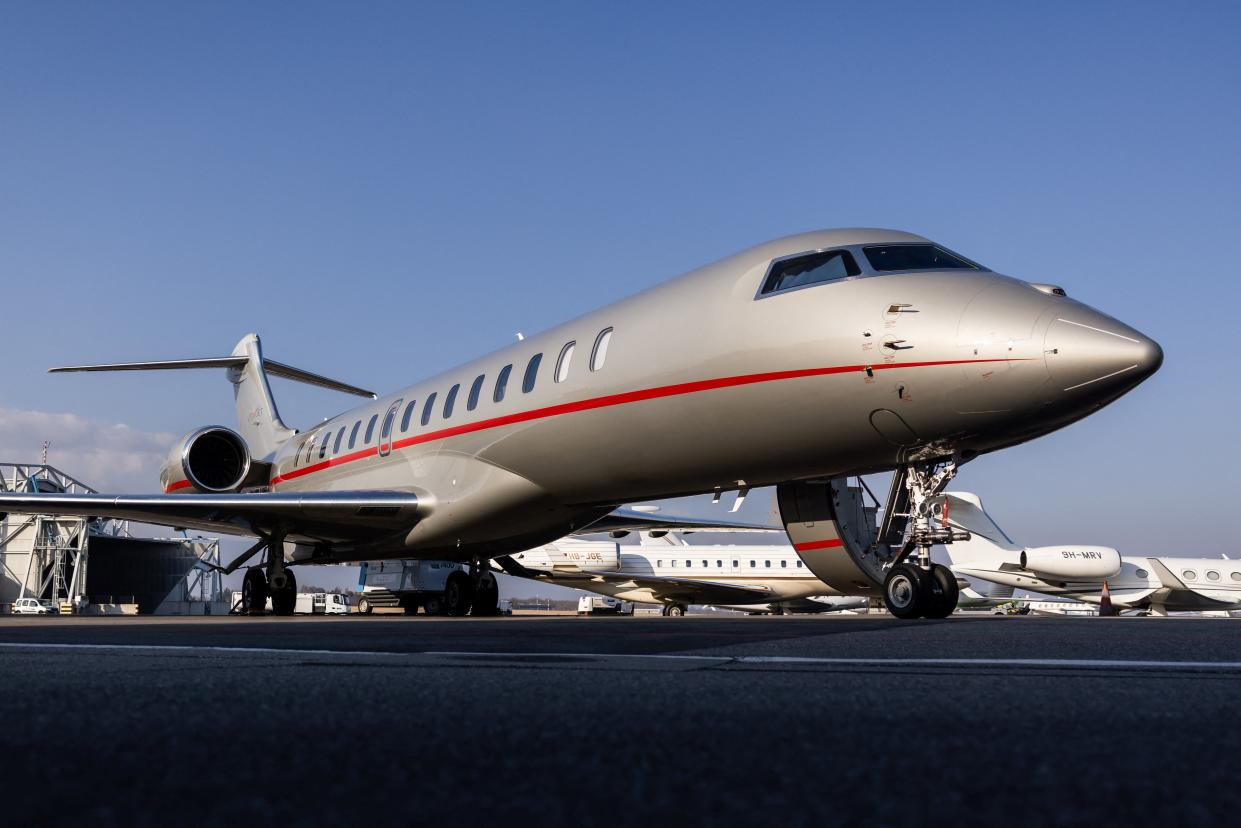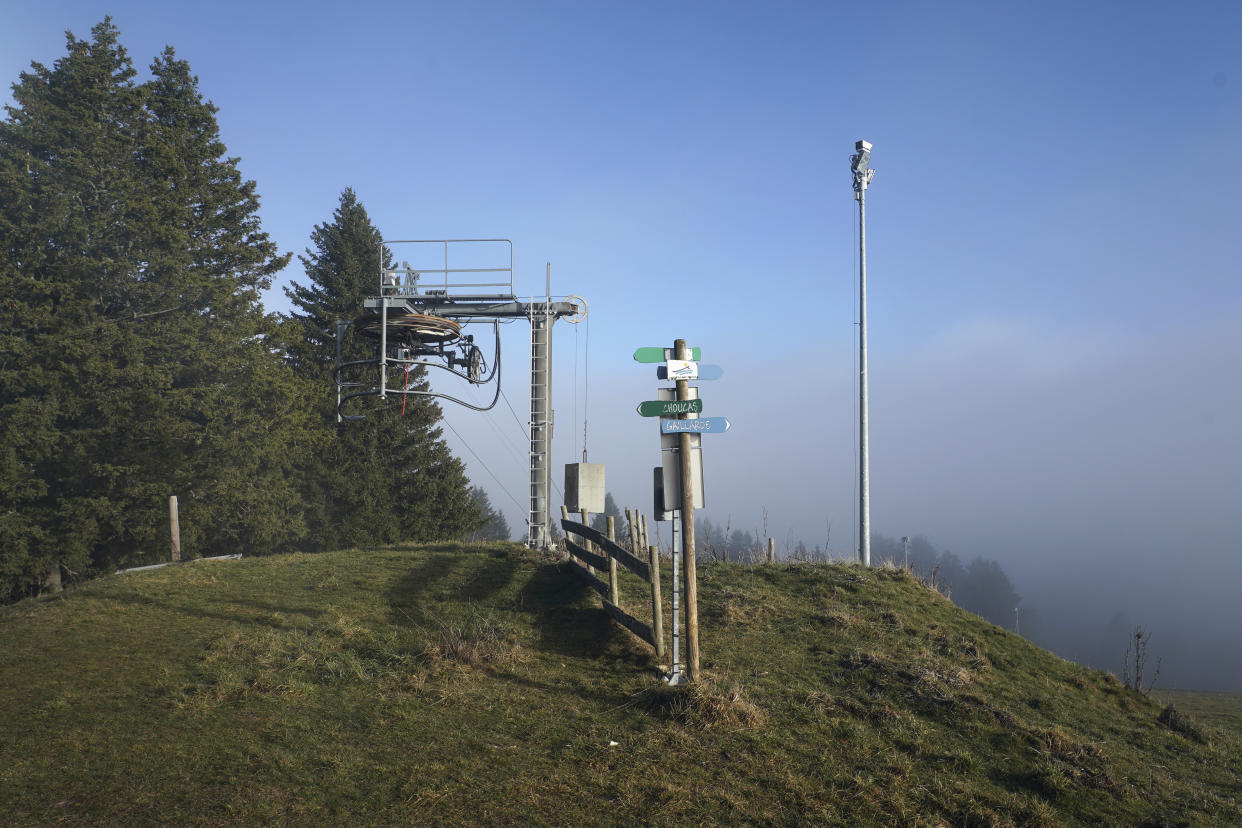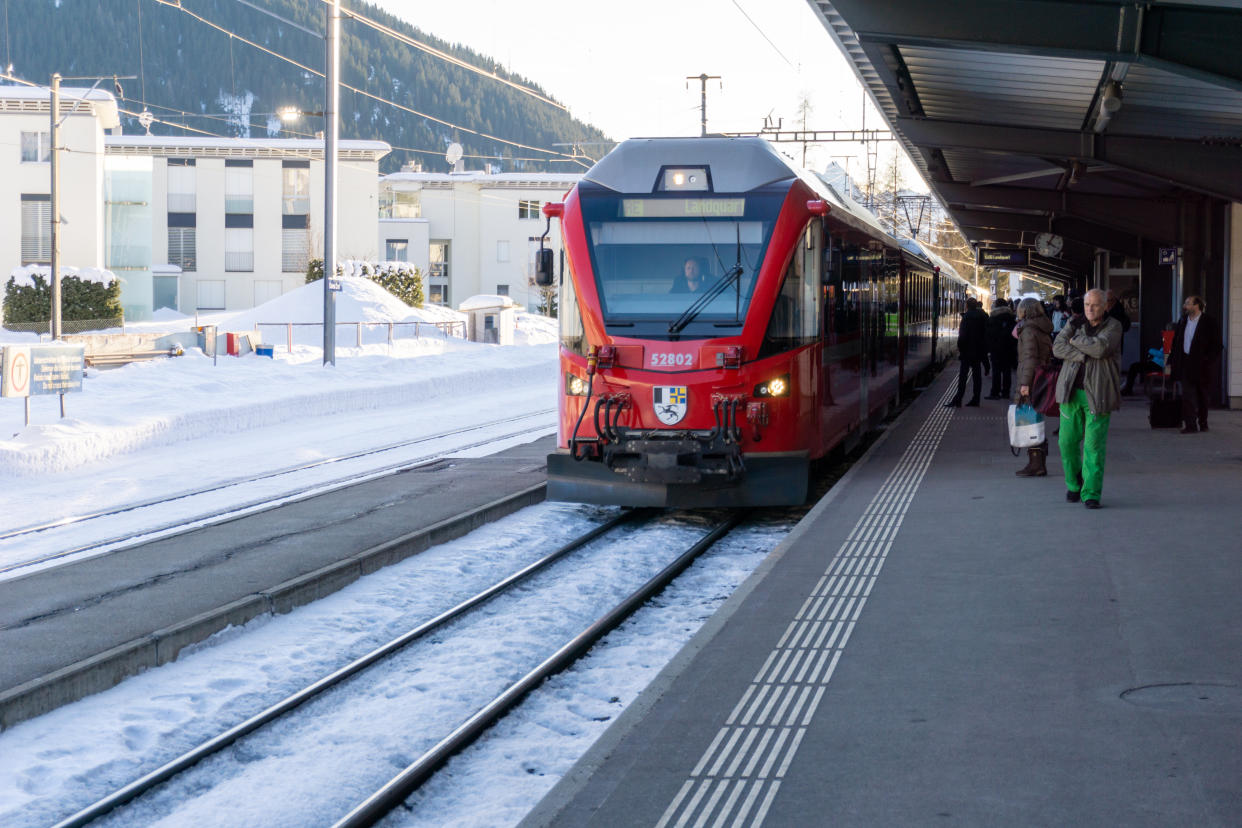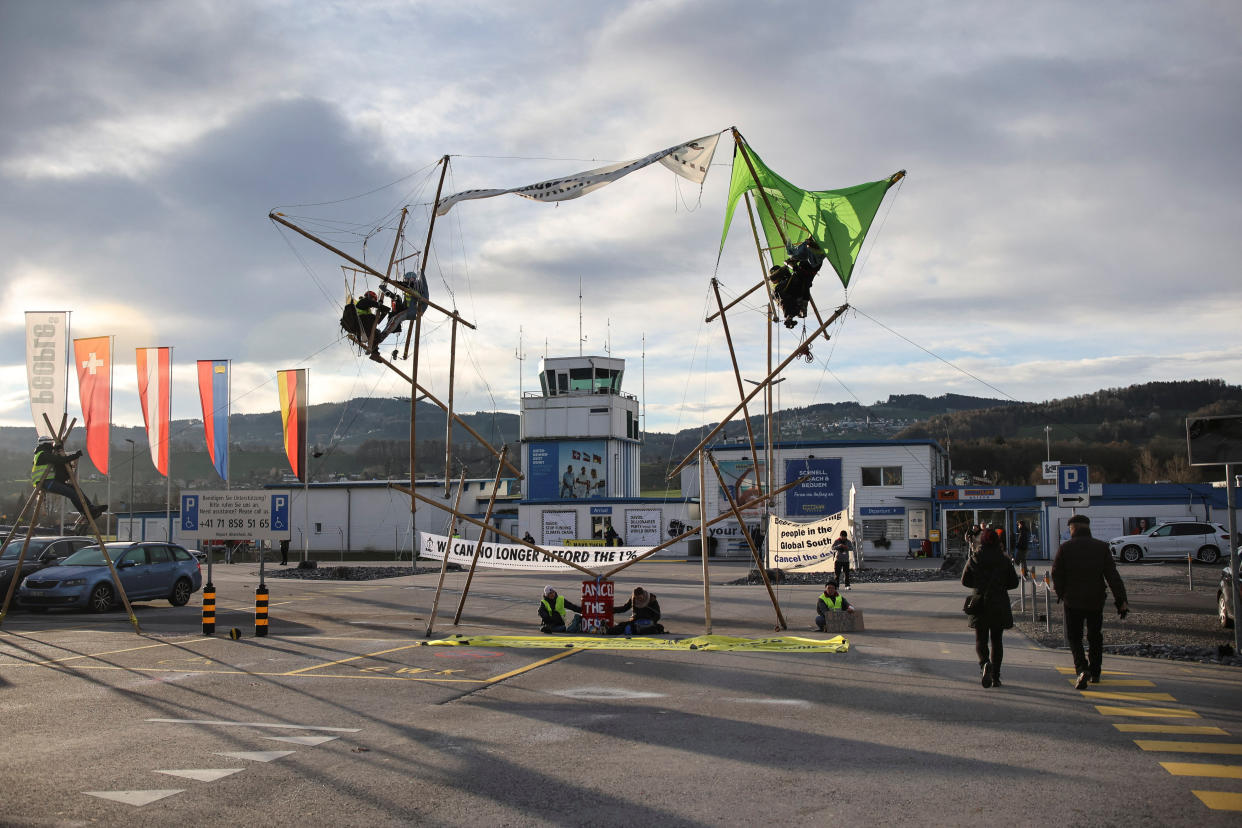The rich and powerful flocked to Davos via private jet to discuss climate change, study finds

At the World Economic Forum, which started Monday in Davos, Switzerland, the global business and political elite will discuss how to combat climate change, but their own private jet travel to attend the conference will cause a spike in planet-warming carbon emissions, according to a new study from Greenpeace International.
The research, released last Thursday, which was compiled by the Dutch environmental consultancy CE Delft, found twice as many private jets flew to and from airports serving Davos during the 2022 WEF meeting compared with an average week. The carbon dioxide emissions from these extra flights were equal to putting roughly 350,000 gasoline-powered cars on the road for the same weeklong period.
In recent weeks, Europe has been contending with a number of extreme weather events related to climate change. A heat wave over New Year’s weekend broke records in locations such as Warsaw, Poland, where a temperature of 66 degrees Fahrenheit was 9°F warmer than the previous all-time high. Parts of Switzerland saw temperatures upwards of 68°F, and some ski resorts in the Alps closed due to a lack of snow. In 2022 — the fifth-hottest year on record — heat waves in Europe smashed records for temperatures and wildfire prevalence.

“Europe is experiencing the warmest January days ever recorded and communities around the world are grappling with extreme weather events supercharged by the climate crisis,” said Klara Maria Schenk, transport campaigner for Greenpeace’s European mobility campaign, in a statement. “Meanwhile, the rich and powerful flock to Davos in ultra-polluting, socially inequitable private jets to discuss climate and inequality behind closed doors.”
The study found that of the 1,040 private jet flights in or out of airports near Davos, 53% were shorter than 466 miles and 38% were under 310 miles. The shortest flight recorded was only 13 miles. Short-haul flights are especially polluting because airplanes are less efficient during landing and takeoff.
For the sake of comparison, the distance between Washington, D.C., and New Haven, Conn., is 305 miles, and between Boston and Washington, D.C., is 440. While it is not uncommon for Americans to fly such distances, Europe has a much more comprehensive, affordable, fast and reliable train network, which serves Davos.

France recently became the first country to ban short flights between cities that are connected by a rail trip of less than two and a half hours. A spokesperson for the French government said at the time that France won’t ban private jets, but it will produce a plan that would reduce private jet usage through taxation and regulation.
Environmentalists are increasingly arguing that the European Union should ban such private flights. Last November, at Schiphol Airport in Amsterdam, 700 climate activists staged a sit-in on the tarmac in front of 13 private jets preparing for takeoff, grounding all of them for more than six hours.
“The superrich have got used to polluting as they please with a total disregard for people and planet, and private jets are the pinnacle of these luxury emissions that we simply cannot afford,” Jonathan Leggett, one of the activists, later told the Intercept.
On Monday, activists from the Swiss Debt for Climate group held a similar demonstration with a four-hour blockade at the airport in Altenrhein, Switzerland, near Davos.

Attendees at this year’s WEF include European Union Commission President Ursula von der Leyen, U.S. climate envoy John Kerry, South Korean President Yoon Suk Yeol and Philippine President Bongbong Marcos. Sens. Joe Manchin, D-W.Va., Chris Coons, D-Del., and Kyrsten Sinema, I-Ariz, and Republican Georgia Gov. Brian Kemp were among those meeting with a group of business leaders, including Hewlett Packard Enterprise CEO Antonio Neri, in Davos on Monday.
In the past, Kerry has been criticized for hypocrisy by conservative media outlets such as Fox News for flying by private jet. Kerry had previously defended his private flights, arguing that his extremely busy travel schedule in the service of combating climate change makes it necessary and noting that he buys carbon offsets to mitigate the impact. But last November, he flew commercial to Egypt to participate in the United Nations Climate Change Conference, known as COP27.
Former Vice President Al Gore spoke in Davos on Monday about climate change, arguing that multilateral lending institutions like the World Bank need to make more funding for a clean energy transition available to developing countries. Gore has said that sometimes he has flown by chartering a private jet but that he usually flies commercial.
Kerry struck similar notes as Gore on climate finance in his Tuesday speech in Davos.
“I’m convinced we will get to a low-carbon, no-carbon economy — we’re going to get there because we have to,” Kerry said. “I am not convinced we’re going to get there in time to do what the scientists said, which is avoid the worst consequences of the crisis. So how do we get there? ... Money, money, money, money, money, money, money.”

Greenpeace argues that the private jet use makes a mockery of the WEF’s stated commitment to helping prevent catastrophic climate change.
“Davos has a perfectly adequate railway station, still these people can’t even be bothered to take the train for a trip as short as 21 kilometers,” Schenk said. “Given that 80% of the world’s population has never even flown, but suffers from the consequences of climate-damaging aviation emissions, and that the WEF claims to be committed to the 1.5°C Paris Climate Target, this annual private jet bonanza is a distasteful master class in hypocrisy. Private jets must be consigned to history if we are to have a green, just and safe future for all.”
There are other climate-focused protests expected at the forum this week. High-profile youth activists Greta Thunberg and Vanessa Nakate will be in town to demand an end to new oil and gas drilling projects. Thunberg has made a point of avoiding flying at all when possible, including by sailing across the Atlantic Ocean, but she has flown when alternatives are unavailable.
The WEF did not immediately respond to a request for comment.
In 2019, when a previous study of private jet usage for flying to and from the forum sparked criticism, the organization responded that participants are taking fewer private flights each year.
“We have been offering incentives to participants to use public transport for some years,” the WEF said in a statement in 2019. “We also ask that they share planes if they have to use them, something that has been gaining popularity in recent years.”
Update: The European Business Aviation Association (EBAA), the National Business Aviation Association (NBAA) and the National Air Transportation Association (NATA) issued a statement contesting Greenpeace's methodology. "Many of the flights associated with the event are not directly related to the event itself," the trade groups wrote. "For example, a short flight of 21 km from Friedrichshafen to Altenrhein, which reportedly increased business jet traffic during the WEF, was not related to the event at all. Instead, it was a repositioning flight that picked up passengers in Altenrhein to fly to Cannes. This flight would have occurred regardless of whether or not the WEF had taken place, and should therefore not be included in estimates of business jet traffic specifically related to the event."
"The second example includes the 1000 supposed private jets, or 500 flights as mentioned by Greenpeace and CE Delft being related to WEF, which is actually a maximum estimate and not a confirmed number. These flights include not only business aircraft, but also many turboprops, military and government airplanes. Many business aircraft continued to another airport after dropping off passengers for the WEF event due to parking constraints, which further inflates the estimate of 500 flights. This means that, in reality, the number of business aircraft associated with the WEF is likely much lower than 500. According to the WEF, the number of aircraft movements is usually around 250 for the organization’s event."
The groups also argued that the expectation that WEF attendees could take the train to Davos was unrealistic in many cases. "Business aircraft are often the only way to reach certain remote locations, such as Davos, which is located in a mountainous region of Switzerland not easily accessible by train or other forms of transportation," they wrote. "For example, travelling [sic] by Business jet from London to Davos takes around 1.5 hours, while a train journey takes 10 to 11 hours."

